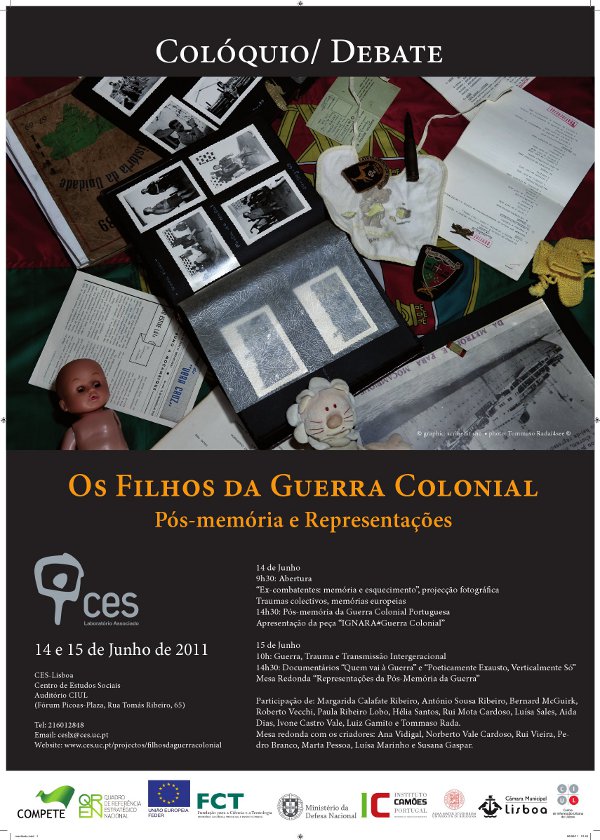International Colloquium
Children of the Colonial War: postmemory and representations
June 14 and 15, 2011, 09h30
CES-Lisbon/Centre for Urban Information of Lisbon
Initiative organized by the project Children of the Colonial War: postmemory and representations
 PROGRAM [download PDF version - Portuguese]
PROGRAM [download PDF version - Portuguese]
Tuesday, June 14
09h30-10h00 | Opening session
10h00-10h10 | Photography exhibition by Tommaso Rada
10h10-13h00 | Session 1: Collective traumas, European memories
Chair: Margarida Calafate Ribeiro (CES)
• António Sousa Ribeiro (CES)
• Bernard MacGuirk (University of Nottingham)
• Roberto Vecchi (University of Bologna)
Debate (12h00-13h00)
Lunch Break
14h30-17h00 | Session 2: Postmemory of the Colonial War
Chair: António Sousa Ribeiro (CES)
• Paula Ribeiro Lobo (Universidade Nova de Lisboa)
• Hélia Santos (CES)
• Margarida Calafate Ribeiro (CES)
16h00-17h00 | Debate
17h00-17h30 | Coffee break
17h30 | Presentation of the play “IGNARA#Guerra Colonial” (Paulo Campos dos Reis, Filipe Araújo and Susana Gaspar)
Wednesday, June 15
10h00-13h00| Session 3: War, Trauma and Intergenerational Transmission
Chair: António Sousa Ribeiro (CES)
• Rui Mota Cardoso (Faculty of Medicine – University of Porto)
• Luísa Sales (Military Hospital of Coimbra/CES)
• Ivone Castro Vale (Faculty of Medicine – University of Porto)
• Aida Dias (CES)
Comments: Luiz Gamito (Psychiatrist, Lisbon)
12h00-13h00 | Debate
Lunch Break
14h30-15h30 | Screening of selected scenes from the documentary films "Quem vai à Guerra", by Marta Pessoa (2011) and "Poeticamente Exausto, Verticalmente Só: a História de José Bação Leal", by Luísa Marinho (2007)
15h45-18h00 | Round table: Representations of War postmemory
Chair: Margarida Calafate Ribeiro (CES)
• With Ana Vidigal (plastic artist), Pedro Branco (musician), Marta Pessoa and Luísa Marinho (film directors), Norberto Vale Cardoso e Rui Vieira (writers) and Susana Gaspar (actress)
18h00-19h00 | Coffee break
19h00 | Book launch of the Antologia da Memória Poética da Guerra Colonial [Anthology of the Colonial War Poetic Memory] (Afrontamento, 2011)
Presentation of the project Children of the Colonial War: postmemory and representations
Between 1961 and 1974 Portugal conducted a long and essentially unacknowledged Colonial War in Angola, Mozambique and Guinea-Bissau. The memory of this war in contemporary Portuguese society is inextricably linked to three key historical events: the fall of the Salazar dictatorship, the Revolution of 25 April 1974, and the process of decolonization. The potency of these events in contemporary Portuguese history and the scant studies of Portuguese colonialism have allowed the war to be seen as external to Portugal. It is not deemed to be something intrinsically internal to both Portugal and the African nations that have since gained their independence. As such, it has become something incomprehensible, and the preserve of groups considered to be the direct carriers of its memory, namely the war veterans and their families.
This research project will interrogate and analyze prevalent thinking about the Colonial Wars taking as its starting point testimony from the children of war veterans. In other words, it will begin with the postmemory of the Colonial Wars—a memory carried by the offspring of war veterans, who grew up submerged in war narratives experienced by their parents’ generation.
The approach taken in this research is transdisciplinary, drawing on and adding to literary criticism, cultural studies, psychiatry, sociology, history, and political science. It will also shed light on three current theoretical trends: the issue of postmemory as manifested through both family and collective memories; the place of trauma in critical reflections about the aftermaths of the Spanish civil war, the Holocaust, the Algerian war, Vietnam war and the Apartheid; and counter-histories from the margins that arise from a problematization of ontological silence, placing the subaltern in a critical trajectory that brings together Gramsci with the Subaltern Studies tradition and, more generally, postcolonial studies.
.jpg)





